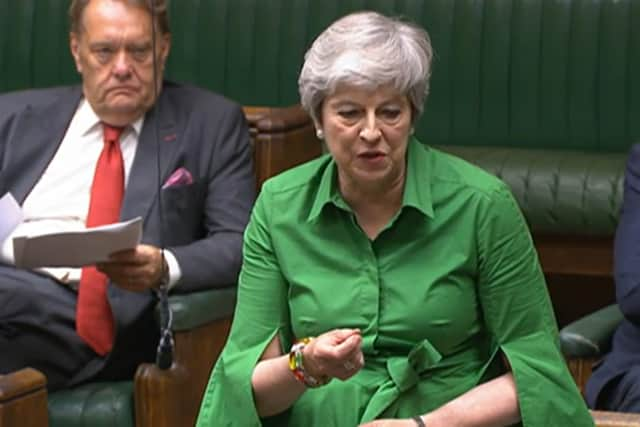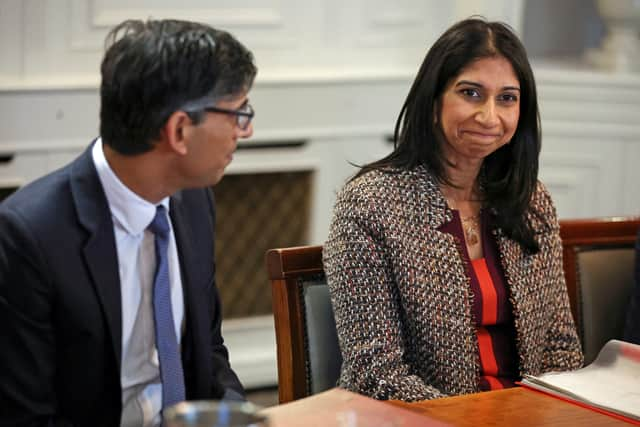Illegal Migration Bill: what changes have been made for refugees seeking asylum in UK?
and live on Freeview channel 276
Former Prime Minister Theresa May has rebelled against the government over its controversial Illegal Migration Bill as she warned MPs that the draft legislation would “consign more people to slavery”.
She told the House of Commons that the bill - which intends to tackle ‘small boat crossings’ by detaining and deporting any migrant deemed to have entered the UK ‘illegally’ - “ties the hands of the police and undoes the good work of the Modern Slavery Act”. The Maidenhead MP then vowed to “persist in disagreeing with the government” over the proposed new law, unless exemptions were made for victims of human trafficking.
Advertisement
Hide AdAdvertisement
Hide AdThe comments were made late on Tuesday (11 July) during a three-and-a-half hour debate in Parliament over amendments to the bill suggested by the House of Lords. Peers proposed that the Illegal Migration Bill be altered so that refugee children detained for the purpose of deportation can be granted immigration bail after eight days - down from the 28 days previously outlined in the draft legislation.
In a further amendment, pregnant women seeking asylum would be able to be detained for a maximum of 72 hours, again down from the previous 28 day proposal. There were also greater protections sought for victims of modern slavery who are exploited in the UK.
MPs ultimately voted to reject the amendments, meaning the bill will be passed back to the House of Lords. But 16 Conservative MPs rebelled and voted against Prime Minister Rishi Sunak and Home Secretary Suella Braverman - calling for further changes and urging the government to remove some of the draft law’s more contentious aspects, which charities and campaigners warned would put the UK in violation of human rights law and the Refugee Convention.


Addressing the House, former Prime Minister May said: “I know that ministers have said this bill will enable more perpetrators to be stopped, but on modern slavery I genuinely believe it will do the opposite. It will enable more slave drivers to operate and make money out of human misery. It will consign more people to slavery. No doubt about it, I think if amendment 56 is overthrown that will be the impact.”
Advertisement
Hide AdAdvertisement
Hide AdTim Loughton was another former Conservative Party minster to raise concerns, saying: “Assurances that we were promised have not materialised or, if they have, I am afraid nobody understands them”. There were also rebellions from Sir Bob Neill, Vicky Ford, Tracey Crouch, and Caroline Nokes.
The Home Office earlier offered some concessions on the bill - with more than 10,000 migrants set to be spared automatic deportation to Rwanda after the government agreed to abandon plans to apply its new powers of automatic detention and deportation to any asylum seeker who arrived after 7 March - the date when the ‘small boats’ bill was presented to Parliament.
Previously, the Home Office wanted to the bill to be retrospective to prevent a surge in asylum seekers trying to reach the UK before it becomes law, but now, the powers will only come into force once the Illegal Migration Bill has passed through all legislative stages and has been granted Royal Assent. Ministers hope this will happen later this summer.
This change has been made, the Home Office said in a statement on Monday (10 July), to provide “reassurance to peers” and to ensure the smooth passage of the bill.
Advertisement
Hide AdAdvertisement
Hide AdHowever, some aspects of the Illegal Migration Bill remain unaltered. Bans on e-entry, settlement, and citizenship will still apply retrospectively to those who arrived illegally on or after the bill’s introduction on 7 March - and the Home Office also said measures will be put in place to ensure its definitions of “serious and reversible harm” cannot be amended by secondary legislation.
Ahead of the debate, more than 60 people – including victims of torture, refugees, asylum seekers and those already granted asylum in the UK as well as around 30 campaign groups - wrote to MPs to express their “horror” at the bill and urge them to oppose the proposed legislation.
But Home Secretary Braverman insisted the Illegal Migration Bill “forms a crucial part of our action to stop the boats and ensure people do not risk their lives by making illegal and unnecessary journeys to the UK” - and said it will “send a clear message that the exploitation of children and vulnerable people, used by criminals and ferried across the Channel, cannot continue.”


Opening the debate, immigration minister Robert Jenrick paid tribute to the Lords for “undertaking its proper role as a revising chamber”, but said some of the changes were “little short of wrecking amendments” as MPs were encouraged to vote against it.
Advertisement
Hide AdAdvertisement
Hide AdThe Labour Party voiced its criticism during the session, with shadow Home Secretary Yvette Cooper describing the Ilegal Migration Bill as a "con". She said: “This bill will make things easier for criminal gangs and make the asylum backlog even worse. Hotel use is still going up, yet this bill will only result in even more people in a permanent and costly backlog.
“And two former Tory Party leaders have joined in warning that this bill will make it easier for trafficking gangs. Today, ministers have voted against measures to crack down on smuggler gangs, measures to make it easier to stop trafficking, and measures to safeguard vulnerable children. They have given up on both common decency and common sense."
After the votes were counted, Braverman accused Labour of siding “with the criminals gangs that trade in human misery instead of the British people”. Now, the bill will be sent back to the House of Lords to be re-considered.
Comment Guidelines
National World encourages reader discussion on our stories. User feedback, insights and back-and-forth exchanges add a rich layer of context to reporting. Please review our Community Guidelines before commenting.
